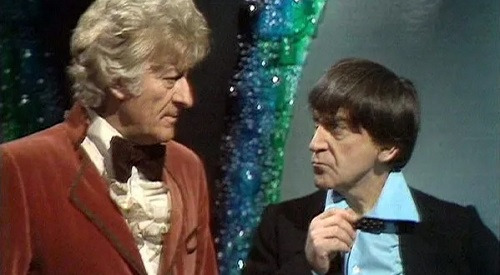#Lawrence Miles
Text

The Book of the War (Lawrence Miles et. al.)
Synopsis: "The Great Houses: Immovable. Implacable. Unchanging. Old enough to pass themselves off as immortal, arrogant enough to claim ultimate authority over the Spiral Politic.
The Enemy: Not so much an army as a hostile new kind of history. So ambitious it can re-write worlds, so complex that even calling it by its name seems to underestimate it.
Faction Paradox: Renegades, ritualists, saboteurs and subterfugers, the criminal-cult to end all criminal-cults, happy to be caught in the crossfire and ready to take whatever's needed from the wreckage… assuming the other powers leave behind a universe that's habitable.
The War: A fifty-year-old dispute over the two most valuable territories in existence: "cause" and "effect."
Marking the first five decades of the conflict, THE BOOK OF THE WAR is an A to Z of a self-contained continuum and a complete guide to the Spiral Politic, from the beginning of recordable time to the fall of humanity. Part story, part history and part puzzle-box, this is a chronicle of protocol and paranoia in a War where the historians win as many battles as the soldiers and the greatest victory of all is to hold on to your own past."
Propaganda: A text which purports to be a constantly shifting and updating guide to The War, a conflict so overarching and complete that every other conflict is but a pale shadow thereof; the Time War. Of course, since it would shift retroactively with the changing timelines, there is no way to prove or disprove this claim. Notable entries include cities built from days stolen from shifting calendars, the secrets of removing yourself from history while still leaving yourself free to interfere, Grandfather Paradox, the location of the exact center of history, how to weaponize banality, and Parablox.
Oh, and there's something else in there. Something that seems to be talking to you.
Alice's Adventures in Wonderland/ Through the Looking Glass and what Alice found there (Lewis Caroll)
"Both books have a similar structure and are spiral for the same reasons: little Victorian child Alice founds herself in a strange world with rules vastly different from hers (for example, there's no real geography and the scenery changes suddenly from one place to another very much like in a dream). The characters she crosses constantly defy her understanding of the world and applies logics she struggles to understand. Even though she ends up going with the flow most of the time she never ceases to question whether shes experiencing real life or a dream; sanity is brought up a few times, and there's also the popular quote "We're all mad here. I'm mad. You're mad", delivered by the grinning cat that appears and disappears like a slippery distortion. Lastly I may add that the TMA episode whose title references the book (Mag 177, Wonderland) is a spiral episode."
#spiral poll#the spiral#poll#the magnus archives#leitner tournament#The Book of the War#faction paradox#doctor who#Lawrence Miles#alice in wonderland#through the looking glass#Lewis Caroll
34 notes
·
View notes
Text
A Faction Paradox film was discussed by Lawrence Miles and a representative of a Warner Brothers subsidiarity in 2003. The representative had obtained an early copy of Political Animals from Image Comics and expressed interest in obtaining the rights to consider a film adaptation of the story. However, Miles had learned just earlier that day that the comic's third issue had been cancelled, and the representative lost interest after Miles described the story as "Amadeus with monsters".
Never forget that we almost got a Faction Paradox movie. It would have probably sucked, true, but then we could have said that the reason it sucked was that the Great Houses had sent Chris Cwej to sabotage the movie.
#faction paradox#faction Hollywood#chris cwej#doctor who#dweu#war in heaven#the enemy#Lawrence Miles#political animals#the great Houses#great houses
19 notes
·
View notes
Text

From "Did Rassilon Know Omega?" in About Time 4 by Lawrence Miles and Tat Wood:
In “The Three Doctors” (10.1) we learn that long, long ago a great engineer called Omega journeyed into a black hole and never returned, but through his efforts made Time Lord civilisation possible. In “The Deadly Assassin” we learn that long, long ago a great engineer called Rassilon journeyed into a black hole but did return, and through his efforts made Time Lord civilisation possible. You can see the problem here.
As we’ve already established, “continuity” didn’t exist in the 1970s, at least not in the modern, post-home-video sense of the word. Throughout Doctor Who there are running themes, ongoing concerns and recurring images. Many of the people who wrote it had read the same literature, or been introduced to it by hard-hearted script editors. So there’s a sense of the programme holding together, but… nobody ever went back to check the details. Did Robert Holmes even remember “The Three Doctors” when he wrote “The Deadly Assassin”? He certainly got the “black hole” bit right, but the Heroes of Ancient Gallifrey don’t match.
Everybody born after a certain date (and extensive research hasn’t yet confirmed what this date is) makes the same assumption: that Omega and Rassilon were contemporaries, that Rassilon finished the work Omega started, and that at some point they must surely have collaborated. Yet this is never stated anywhere in the series.
Rather, it’s a view which started to become “concrete” in the minds of fans in the early ’80s, largely thanks to Doctor Who Magazine. When a confused reader wrote into DWM’s “Matrix Data Bank” column, and asked for an explanation as to how Omega and Rassilon could both have the same sort of mythic status in Time Lord history, the reply seemed reasonable. Omega was the hands-on engineer, whereas Rassilon was more of an aristocratic, organising-principle type. […]
In both “The Three Doctors” and “The Deadly Assassin”, the ancient-Time-Lord-in-question is presented as an iconic figure, but neither Omega nor Rassilon is considered to be of great importance to modern Gallifrey. Rassilon isn’t treated as the great demiurge of Time Lord civilisation in “Assassin”; Co-Ordinator Engin believes that very few people care about the Old Time. Symbolically, at this stage Omega and Rassilon might as well be one and the same, even if one got out of the hole and the other didn’t. In a way it’s a pity that both of them had to turn up on our screens, in person, in 1983. Up until then the writers could justifiably have claimed that they were two different names for the same individual, and that the Time Lords had just got their history a bit muddled.
Perhaps important background to understand the Faction Paradox series' reinterpretation of the Founder(s) as "Urizen" …
#archival#urizen#about time#lawrence miles#rassilon#omega#the three doctors#the deadly assassin#doctor who#gallifrey
23 notes
·
View notes
Text
Toy Story by Lawrence Miles: the TARDIS has a secret name that it will never ever tell anyone that is not their pilot
The Doctor’s Wife by Neil Gaiman: that name is Sexy.
42 notes
·
View notes
Text
Oh Herr Mozart, I must say….
This edible ain’t SHIT!
*30 SECONDS LATER*
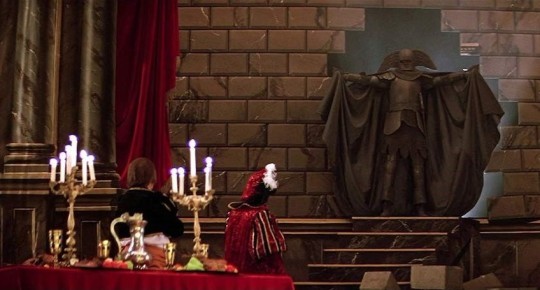
*breaks down the wall like the fucking Kool-Aid man*
My GOD!!!!!!
*Don Giovanni Overture suddenly and ominously begins to play*
#personal stuff#dougie rambles#amadeus#amadeus 1984#wolfgang amadeus mozart#mozart#don giovanni#faction paradox#my poor attempt at a joke#the adventuress of Henrietta street#tangential#shitpost#highbrow shitposting#edibles#or lack thereof#classical music#Lawrence miles#milos forman#what#no context#this edible ain't shit#zonked#opera#kool aid man#oh yeah#oh no
54 notes
·
View notes
Text
The BBC Eighth Doctor Adventures "War in Heaven" arc, as it may have originally been
The BBC Eighth Doctor Adventures, at their start, didn't have any arc set-in-stone, and so author Lawrence Miles wrote the masterpiece Alien Bodies, kick-starting the "War in Heaven" arc. However, on 3 July 2000, The Ancestor Cell was published, putting an end to the War in Heaven arc, at least within the EDA range.
Before this novel was published, Lawrence Miles had other ideas for the War in Heaven, and I for this post have attempted to reconstruct a rough timeline for what could have been, from the available evidence. Bear in mind that I have taken some creative liberties and speculation. As there will be quite a few different stories in different ranges, some released and some unproduced, I've decided to code them for convenience: first off, assume everything is a published EDA unless told otherwise - then, green is for a part of the "Bernice Summerfield" New Adventures, blue is for Past Doctor Adventures, orange is for anything else, and bold is for unproduced (these can be combined).
Prelude
Down (September 1997)*: the Gods are introduced, setting up a War seemingly separate to the War in Heaven. This most likelywasn't originally intended to tie-in to the EDAs, or be part of the War in He and, but was brought in by Dead Romance.
Alien Bodies (November 1997): Faction Paradox, the Enemy, the Celestis, and the state of Gallifrey and it's cloneworlds during the War in Heaven is introduced and established as being in the Eighth Doctor's future.
Unnatural History (June 1999): small skirmish with Faction Paradox. It is altogether unclear whether they come from the War or from the Eighth Doctor's time
Act 1
Dead Romance (1 March 1999): the universe of the VNAs, that of Chris Cwej, is implied to be in a bottle in the EDA universe, as itself contains a bottle. Later stories would draw continuity with the VNAs, and The Ancestor Cell (not counted in this list) saw the merger of the bottle into the main universe. This is also implied to be the case by the fact that Cousin Eliza - Christine Summerfield - appears to be in the prime universe by The Faction Paradox Protocols. Personally, I reconcile these by concluding that only the later VNAs starring Bernice Summerfield, which lacked the BBC Doctor Who license, are part of this "bottle", and that Christine used the Gods of that universe to climb out of it, as she implies at the end of the novel.
Interference: What Happened On Earth (August 1999, part of "Interference"): a major interaction with the War; the Doctor prevents the destruction of Earth by wartime powers, thus marking his first major intervention in the War, as Earth is a cradle point of casualty. The War also infects the Doctor's timestream back to his third incarnation, in Interference: What Happened On Dust.
Toy Story (1999/2004)*2: Lolita talks to the TARDIS.
Interference: Foreman's World (August 1999, part of "Interference"): I.M. Foreman reveals the bottle universe, says the people within created their own bottle universe, and it is lost. This effectively confirms the implementation in Dead Romance. Interestingly, as far as I know, most people read Interference first, completely missing the fact that the ending of it is meant to confirm Dead Romance, not foreshadow it. At least, I completely missed that.
Beneath the Planet of the Spiders (after "Interference"): The Fourth Doctor combats the Eight Legs in place of the Third Doctor, and presumably the effects of Interference are further explored.
Valentine's Day (after "Interference"): the Doctor exiles himself for fear of regenerating into something worse than Faction Paradox could imagine. With his absence, the Daleks rise to power. The Doctor then trains a replacement, with the combined help of the Time Lords and Faction Paradox. Ideas of a replacement were adapted by Miles into The Adventuress of Henrietta Street, where the replacement is Sabbath Dei.
The Taking of Planet 5 (October 1999): Mictlan, realm of the Celestis, is destroyed, and the Doctor aids in saving the rest of the universe.
The Shadows of Avalon (2000): The specifics of Compassion's transformation into a TARDIS, and potentially the transformation in totality, were probably not part of Miles's original plan. However, he notably didn't contradict it in The Book of the War, so this will still be included.
Act 2
From here on out, there aren't any actual plans for Eighth Doctor novels, although that is likely just due to the small gap between Interference and The Ancestor Cell. Nevertheless, this has the interesting diegetic effect of making it seem that the War has started to escape the Eighth Doctor, and is widening it's girth.
First I shall list the unproduced novels that would fit into here, and then offer my diegetic summary:
The War (after 12 March 1999): Pertaining to an unknown range, perhaps the Past Doctor Adventures (as it also included the non-past Infinity Doctors and would have included the future Requiem), this would have featured Joanna Lumley's Thirteenth Doctor being in a concentration camp with other "strays from other realities", all taken from BBC sitcoms which the BBC still had rights to. @verityshush commissioned Wenart Gunardi to make a cover for this, in the style of the Virgin New Adventures (the anachronism fits)
Requiem (after 1998's "Interference"): There is a "huge, bone-like thing" in the sky over a war-paranoid Gallifrey. Miles contested that "The Ancestor Cell" copied the idea of this, but the thing in the huge black bone structure in Requiem reportedly was totally different to in "The Ancestor Cell".). There would have been 5 sequels to Requiem, all following this "future incarnation of the Doctor". Presumably these would have crossed over with the BBC Eighth Doctor Adventures at at least one point, if not more.
Below is my deigetic imaging of what could have been.
The War in Heaven expands beyond the Eighth Doctor's timestream, and begins infecting both alternative timelines (The War) and future incarnations (Requiem). The future incarnations may be an "infection" of the developing War, as the Doctor "originally died on Dronid", but as it's heavily implied that's not quite what happened, he could have easily experienced Requiem first and then gone back to the beginning of the War (which should be impossible, but just look at how many times the Eighth Doctor interacted with the future War) to be found on Drornid.
Despite expanding beyond the Eighth Doctor, it still chases him, or to be more specific, the War Queen Romana chases him, Fitz, and their timeship Compassion. Eventually, in unknown book (unknown because future novels with the War Queen Romana never even got to the pitching state, but feel like they should have existed), the Doctor would regain his TARDIS, and in my ideal world it would have regenerated (not because I don't like the Victorian parlour, quite the contrary, I the arc would be more impactful if it had a permanent effect). I think that after he gets his TARDIS back, the Eighth Doctor should just keep on as normal, not really seeing the War all that much, perhaps even his TARDIS has engineered itself to not ever collide with it again - without the Doctor's knowledge? - but there's no "cataclysmic", The Ancestor Cell -like removal of the War.
Compassion, now a timeship separate from the Doctor, Fitz, and the Doctor's TARDIS, would leave the "TARDIS team" and eventually get the companion "Carmen Yeh"*3
Finally, an unnecessary but nice note on how Compassion become the mother of timeships:
The Book of the War, specifically the entry on "Carmen Yeh", features Compassion confronting the War King, and entering into diplomatic relations with him. This is likely the intended point by Miles of when Compassion would have aided in the reproduction of the 103-forms, as opposed to The Shadows of Avalon's version (rape).
*I have not actually read this book, my info for it derives solely from Nate Bumber's blogspot about the Bernice Summerfield War
*2 This was first published in the charity anthology Perfect Timing 2, and then later reprinted in Mad Norwegian Press's edition of Dead Romance
*3 In the Perfect Timing short story "Schrödinger's Botanist", Carmen Yeh would meet Compassion and join her.
Tagging (with permission): @doctornolonger
#faction paradox#doctor who#eighth doctor adventures#the war in heaven#eighth doctor#lawrence miles#essay#a wartime paradox
44 notes
·
View notes
Text
The Doctor’s Rejuvenation

Something I read online a few months ago led me to look into how the concept of regeneration had evolved over time in Doctor Who. I found a fascinating essay titled “When Was Regeneration Invented?” in Tat Wood and Lawrence Miles’s book, About Time 3: The Unauthorized Guide to Doctor Who. They make the solid point that regeneration was not always as we think of it now. It was originally more of a rejuvenation.
When the First Doctor turned into the Second, the implication was that this was not a natural biological process, nor was it the kind of change we are used to now. It was a rejuvenation caused by the TARDIS, and the Second Doctor was intended to be the same man as the First. He may not have been merely a younger version, but he was intended to have a similar personality, just with a younger and stronger body. They quote the script editor at the time, Gerry Davis, as describing those two Doctors like “Jekyll and Hyde.” So in many ways, Troughton was a way of seeing what Hartnell’s Doctor had been like in his youth, perhaps literally, perhaps only in terms of personality.
Even the regeneration between the Second Doctor and the Third was not what we are familiar with. This one happened as a punishment by the Time Lords when they catch up to our renegade Doctor. The Doctor reacts in shock at the prospect of having his face forcibly changed. Wood and Miles describe this procedure as a kind of Time Lord surgery, where the Doctor’s appearance was unnaturally altered but his interior self and personality were meant to remain unchanged. And even during the Third Doctor’s era, the notion of changing faces is not taken as a normal part of Time Lord life.
We finally get the regeneration we are more familiar with when the Third Doctor turns into the Fourth. The term itself is introduced, as is the notion that it is a natural part of a Time Lord’s life cycle. And more of the now-familiar lore would be introduced after that, especially in the Fourth Doctor’s era.
But it’s fascinating to think about how different this concept originally was. As franchises grow, lore is established and different ideas are standardized and organized in a way that makes sense. To a newcomer it all seems to fit together cohesively (mostly), but it is great to see how this whole is a synthesis of very different concepts. And it is fascinating to see what some of those ideas looked like in their original context.
50 notes
·
View notes
Text

[ID: excerpt from Alien Bodies by Lawrence Miles that reads: 'Maybe it's different this time. If the Time Lords are at war, the enemy's got to be someone big. I mean, forget the Daleks, I'm talking big.' End ID.]
LMAO at the EDAs prematurely dunking on nuwho's underwhelming attempt at a time war that ultimately ended up looking like a generic scifi laser battle instead of the incredibly fucked up and incomprehensible Nightmare that it should've been
#the more i read/listen to dr who expanded universe stuff the more im seeing how nuwho copied A Lot of stories and concepts from it#and whether it was intentional or not. none of them have come close to being as good as the original#alien bodies#eighth doctor adventures#lawrence miles#EDAs#eda lb#eight era
10 notes
·
View notes
Text

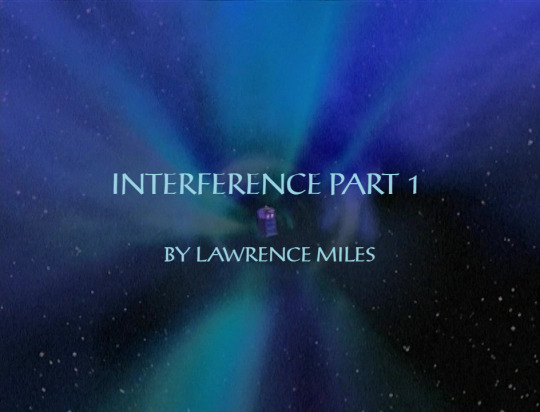

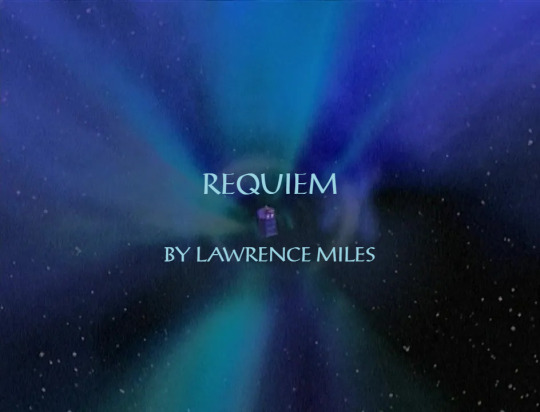
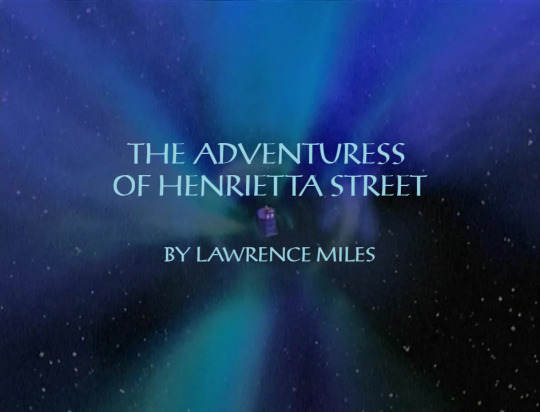

Some Milesian titlecards.
#faction paradox#doctor who#lawrence miles#8DAs#8th doctor#titlecards#bbc doctor who#dr who#whoniverse
52 notes
·
View notes
Text
What surprised the Doctor was not the mere fact of Romana's regeneration, but the seeming casualness with which she was treating the occasion—not to mention the degree of regeneration control she seemed able to exercise.
The Doctor's own regenerations had been rather haphazard affairs, usually in response to some kind of crisis, and the bodies he'd acquired had been very much a matter of pot luck.
Romana, on the other hand, seemed to be changing bodies as casually as she might have changed her dress. Except that the body she'd finished up with was a direct copy of someone else's. The Doctor frowned, remembering that in a purely academic sense, Romana's qualifications from the Time Lord Academy were rather higher than his own. No doubt that accounted for her superior control.
- Doctor Who and the Destiny of the Daleks, Terrance Dicks
“[...] Time Lords of those ‘newblood’ Houses for whom a change of body is as trivial as a change of fashion, and who come straight from the loom with a secondary heart.”
- Christmas on a Rational Planet, Lawrence Miles
#this is literally nothing new lmao I just think I never appreciated how Miles is blatantly paraphrasing Dicks' wording#Christmas on a Rational Planet#Destiny of the Daleks#Doctor Who and the Destiny of the Daleks#Fourth Doctor#Romana#romanadvoratrelundar#House Dvora#Terrance Dicks#Lawrence Miles#I had a pretty intense burnout with a lot of the EU stuff and I know that's been a little apparent#and I'm honestly SO happy kind've staying in a Classic Who lane rn it's been making me really happy#but Miles' stuff is still SO dear to me it's an old friend?#EDAs and The Book of the War are still mine it's nice#I got the biggest grin skimming back through Christmas on a Rational Planet lmao
71 notes
·
View notes
Text
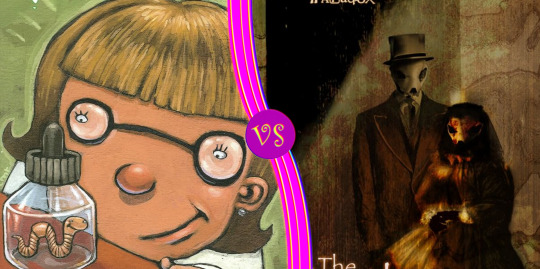
The Word Eater (Mary Amato)
"The titular Word Eater is a worm born with eyes and the magical ability to eat words instead of dirt, named Fip. Whenever Fip eats a word, the object or subject that word was referring to vanishes, at one point accidentally erasing a recently discovered star. When used on a subject, erasure removes any ontological effects, as when used on a torturous dog training method the dogs it was used on all suddenly become docile instead of vicious. The conflict of the story comes in the fact that words are the only thing Fip can eat, so keeping anything else from being erased becomes a matter of starving him. There's also some disgruntled students who almost use him to erase their school, with the protagonist worrying that the effect could abstractly extend to the staff and students, necessitating their thwarting."
The Book of the War (Lawrence Miles et. al.)
Synopsis: "The Great Houses: Immovable. Implacable. Unchanging. Old enough to pass themselves off as immortal, arrogant enough to claim ultimate authority over the Spiral Politic.
The Enemy: Not so much an army as a hostile new kind of history. So ambitious it can re-write worlds, so complex that even calling it by its name seems to underestimate it.
Faction Paradox: Renegades, ritualists, saboteurs and subterfugers, the criminal-cult to end all criminal-cults, happy to be caught in the crossfire and ready to take whatever's needed from the wreckage… assuming the other powers leave behind a universe that's habitable.
The War: A fifty-year-old dispute over the two most valuable territories in existence: "cause" and "effect."
Marking the first five decades of the conflict, THE BOOK OF THE WAR is an A to Z of a self-contained continuum and a complete guide to the Spiral Politic, from the beginning of recordable time to the fall of humanity. Part story, part history and part puzzle-box, this is a chronicle of protocol and paranoia in a War where the historians win as many battles as the soldiers and the greatest victory of all is to hold on to your own past."
Propaganda: A text which purports to be a constantly shifting and updating guide to The War, a conflict so overarching and complete that every other conflict is but a pale shadow thereof; the Time War. Of course, since it would shift retroactively with the changing timelines, there is no way to prove or disprove this claim. Notable entries include cities built from days stolen from shifting calendars, the secrets of removing yourself from history while still leaving yourself free to interfere, Grandfather Paradox, the location of the exact center of history, how to weaponize banality, and Parablox.
Oh, and there's something else in there. Something that seems to be talking to you.
#spiral poll#the spiral#poll#the magnus archives#leitner tournament#The Word Eater#Mary Amato#The Book of the War#faction paradox#doctor who#Lawrence Miles
15 notes
·
View notes
Text

Proving that straight sex is dangerous: The Chris Cwej method.
Chris Cwej has gay sex: Gets blown in the back of a cab in the 80s, trace elements of his 30th century super semen are used to cure AIDS.
Chris Cwej has straight sex: Cries during and after sex, proceeds to end the world and die of radiation poisoning before regenerating into a redditor.
Still think straight sex is a joke???
#it's true#look it up#chris cwej#virgin new adventures#doctor who#faction paradox#pride month#lawrence miles#russell t davies
20 notes
·
View notes
Text
Lemon Jelly. Creationism. Fight Club. The cinema of Hal Hartley. All this and more will be touched upon in the Dale's Ramblings Sixth AnniVARsary Spectacular, as we look at the last of Virgin's Decalogs.
#doctor who#bernice summerfield#virgin books#virgin decalogs#nakula somana#stephen baxter#jeanne cavelos#dominic green#stephen marley#lawrence miles#mike o'driscoll#liz sourbut#ian watson#neil williamson#paul leonard#jim mortimore
4 notes
·
View notes
Text
Once, Media was a contested ground, in which the impulse to educate was in tension with the injunction to entertain. Now – and the indispensable Lawrence Miles is incisive on this, as on so many other things, in his latest compendium of insights – Old Media is almost totally given over to a vapid notion of Entertainment… and so, increasingly, is education.
— Mark Fisher, "Choose Your Weapons" (2007)
#very satisfying to look this up in my physical copy of k-punk#archival#lawrence miles#mark fisher#lost futures#this town will never let us go#remote#ghost point
15 notes
·
View notes
Text
Have been rewatching Torchwood for fanfic reading reasons and am currently noting a weird thematic resonance with Interference that can only sort of be summed up as 'rage against the doctor for not being real', which on the one hand is pretty fascinating from a doylist perspective in terms of the huge cultural impact the show has historically had and still continues to have, and on the other, well.
I, being an american with no greater cultural ties to doctor who than my own personal enjoyment and as someone who got into the franchise as an older teen/almost adult in the early 2010s, simply don't have the background necessary to find it anything other than kind of tedious watsonianly.
Like from a human cultural perspective, really interesting to observe how this chunk of gen x fans have bone deep not even opinions but sincerely held bedrock beliefs about the show, but consuming fiction about these beliefs is just like 'well I'm sorry but I can't blame Dr Who for not saving me from the horrors of real life because they are not real'.
Their respective attitudes about it are however very funny, given Russell's response was 'we are filthy sinners who don't deserve the Doctor' meanwhile Lawrence was just like 'fuck that asshole I'm Going To Kill Him'.
#doctor who#russell t davies#lawrence miles#megan whines into the empty abyss of cyberspace#torchwood#eighth doctor adventures
16 notes
·
View notes

